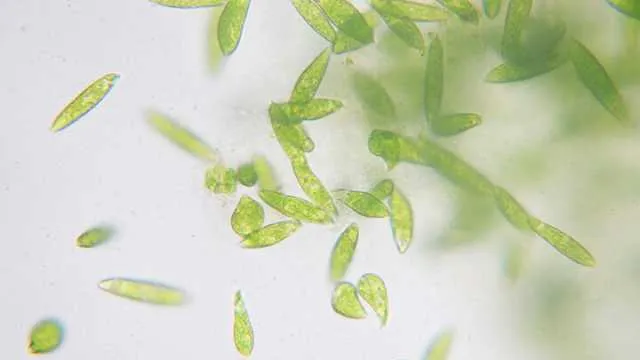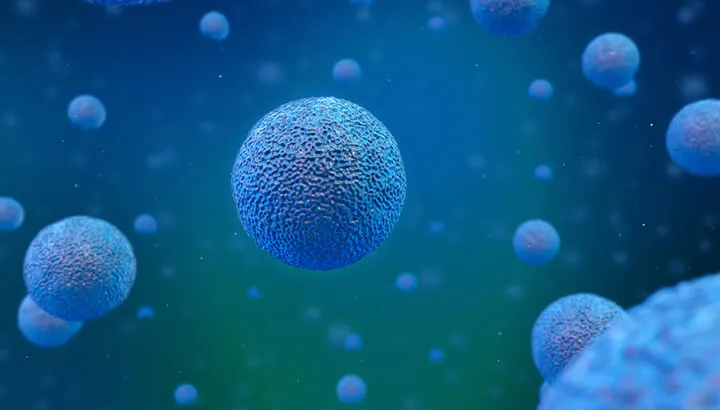
- Share on Facebook79
- Share on Pinterest
- Share on Twitter
If you’ve heard about the amazing health benefits of chlorella or spirulina, you’ll want to know more about marine phytoplankton. Like these two superfoods, phytoplankton are micro-algae which provide one of the richest sources of nutrients on the planet.
To call marine phytoplankton a type of seaweed would be simplifying the matter a little too much. The word “phytoplankton” is derived from the Greek phyto (plant) and planktos (wandering). They’re not actually plants at all, but single-celled aquatic organisms. They have been around for a casual three billion years or so. Kind of puts that lemon to shame, when you think about it!
Phytoplankton health benefits are legendary. Scientists have begun to consider marine phytoplankton as the future of natural medicine, due to their high concentrations of antioxidants, nutrients, enzymes and minerals. This combination of powerful compounds makes phytoplankton a true superfood. It’s one which can bring many positive health changes into your life.
What is phytoplankton?
Phytoplankton are neither plants nor animals. They belong to a group of eukaryotic, single-celled microorganisms called protists. If that doesn’t mean too much to you, don’t worry. Suffice it to say that they’re curious little creatures that are highly beneficial to your health!
According to NASA, phytoplankton are the most important organisms in the world. They make up the foundation of the aquatic food web, feeding anything from microscopic zooplankton all the way up to blue whales (the largest animal on Earth). For this reason, they literally feed the world. They convert the sun’s energy into nutrients, which then make their way into the food chain… all the way up to us!
Phytoplankton, both marine and freshwater, provide more than 90 percent of the world’s oxygen. They also collectively make up an estimated 25 percent of all “vegetation” on the planet. This gives credit to NASA’s declaration of them being the world’s most important organism. Without phytoplankton, it’s likely that life on Earth would quickly vanish.
The most important thing to know about phytoplankton is that they are vast nutrient sinks. They absorb the energy of the sun and gather the nutrients in the water around them to create their own food via photosynthesis. In this way, they accumulate inorganic nutrients and minerals within themselves and make them bio-available. This means that the phytoplankton health benefits are very impressive indeed.
Here are six phytoplankton health benefits:
1. Nutrients, antioxidants and minerals
Beyond all the other amazing properties of phytoplankton, easily the most important thing is their ability to replenish depleted stores of important antioxidants, minerals and other critical nutrients. Even as far back as the 1950s, phytoplankton were being studied for their potential in human nutrition.
These studies continue to reveal new insights into the nutritional powerhouse that is phytoplankton. Scientists have so far uncovered hundreds of nutritional compounds in marine phytoplankton, including every known nutritional molecule. Lab research is even uncovering nutrients in phytoplankton which we didn’t even know existed up until this point!
Not only are phytoplankton a great source of vitamins, minerals and other nutrients, they’re also a highly bio-available source of nutrients. Because the compounds in marine phytoplankton are five times smaller than red blood cells, they can directly enter and nourish your body’s cells from the inside, much like glutathione. This makes phytoplankton not only one of the richest natural sources of nutrients but also the most efficient.
2. Detoxification
Just as phytoplankton oxygenate and detoxify the waters they live in, so too can they replenish and cleanse our own bodies. Scientists have recently become fixated on something called Superoxide Dismutase (SOD). This is an antioxidant which appears to be directly correlated to the lifespan of any living organism. And one of the best bioavailable sources of this mystical life-giving nutrient is phytoplankton.
SOD is created naturally within our bodies, yet levels can fluctuate and decline significantly over time. This has led researchers to theorize that certain people live longer than others purely on account of having higher concentrations of SOD. If you need proof, take a look at the Galapagos Tortoise. They can live more than 150 years, and they have some of the highest SOD levels of any animal on the planet!
As this 2007 study indicates, phytoplankton use SOD to protect themselves from UV damage, which can cause DNA degradation, impairment of photosynthesis, reduced respiration and impaired metabolic function. While we don’t need to worry too much about photosynthesis, we could certainly do with a helping hand on all the other fronts!
Beyond the protective effect of the SOD in phytoplankton, however, is its strong detoxifying role. SOD is important in the protection of our bodies’ cells and helps to control our cellular ability to remove toxins. People who have higher levels of SOD have lower levels of toxins and a higher rate of cell repair. The result is a healthier body and a lower rate of cell oxidation, which is linked to aging.
3. Improved mood and energy

Getting a regular supply of marine phytoplankton in your diet has been shown to fight depression, improve mood and even elevate energy levels. Researchers at the University of Utah conducted a randomized, placebo-controlled pilot study to determine the effects of supplementing with Alpha 3 CMP, an easily digestible form of marine phytoplankton. Researchers randomly assigned study subjects to four groups, comprised of a liquid Alpha 3 CMP group, a powder Alpha 3 CMP group, a placebo group and a control group that didn’t take anything.
The results were very promising indeed. Not only did both Alpha 3 groups show significant increases in immune function, they also experienced notable emotional improvements. Participants from the phytoplankton groups reported “feeling full of life, feeling lots of energy, and feeling calm and peaceful.” Alpha 3 subjects also showed a significant increase on the Authentic Happiness Inventory.
4. Liver support
You’re probably already aware that your liver is the body’s first line of defense against toxins and other compounds that can otherwise do you harm. For this reason, a healthy liver means a healthy body. As we age, however, environmental toxins continue to accumulate inside our bodies and overload the liver. This reduces its ability to perform its role as the master detoxifier, which feeds back negatively into your health.
Because phytoplankton can directly penetrate and nourish your cells, the body doesn’t need to rely on the liver to process them. This not only gives your liver a much-needed vacation, it can also improve the state of the liver by reducing its workload and cleaning your cells of accumulated toxic compounds.
5. Cellular regeneration

Phytoplankton supplementation can support healthy cell membranes and stimulate the regeneration of existing cells to make them shiny and new again! A species of phytoplankton called Nannochloropsis gaditana is believed to be particularly good at this.
Scientists have discovered that this particular species of phytoplankton contains more than 65 cell-supporting compounds, including all varieties of amino acid, the full range of essential fatty acids, vitamins, minerals, antioxidants, electrolytes, nucleic acids and enzymes.
Because our cells can become weakened over time due to things like hydrogenated or rancid vegetable oils, phytoplankton appears to be an effective way to directly improve the state of your cells. And because cells are the building blocks of life, healthier cells means healthier you!
6. Improved methylation
While this may be the first time you’ve heard about it, methylation is a critical process occurring billions of times per second throughout your body. This process occurs when one molecule essentially exchanges a methyl group (composed of one carbon and three hydrogen atoms) with another molecule. This exchange is occurring nonstop across every part of your body, controlling everything from stress response to energy production and neurological processes.
Because this process is so integral to the proper functioning of our bodies and minds, impaired methylation can have profound negative effects on our health. With reduced methylation comes cellular breakdown, increased risk of cancer and cell mutations.
Luckily, there’s a simple solution for supporting methylation processes in your body. Due to its wide range of amino acids, minerals and vitamins, marine phytoplankton ensures healthy methylation is taking place. The result is improved cell division and growth, reduced risk of disease and increased longevity. Not bad for drinking a small glass of green stuff every day!
How to get quality marine phytoplankton
As this study shows, not all phytoplankton is beneficial for your health. Certain species of phytoplankton have been associated with toxic algal blooms which can harm both aquatic life and humans.
It’s highly unlikely that you’re going to come across a store selling any of these varieties. However, the point to remember is that not all phytoplankton are created equal. Where possible, seek out phytoplankton products which use Nannochloropsis Gaditana (NG). That’s the species we discussed earlier which has high levels of SOD. Not only this, NG also contains one of the most comprehensive ranges of vitamins, nutrients and minerals. It also plays a critical role in cellular regeneration.
It’s also important to source phytoplankton from uncontaminated sources. Obviously, buying phytoplankton products which originated in the polluted waters around China, for example, is a bad idea. The heavy metals, chemicals and other toxins found in these waters can drastically lower the quality of your phytoplankton supplement.
You can seek out phytoplankton from cleaner waters, such as those off the coast of Alaska. However, it’s safer to purchase those which have been grown in a photobioreactor. This equipment allows manufacturers to create the perfect conditions for marine phytoplankton growth. They ensure your supplement is the best it can possibly be.
— Liivi Hess
Want to know more about the health benefits of phytoplankton? Check out this article!
- Share on Facebook79
- Share on Pinterest
- Share on Twitter

